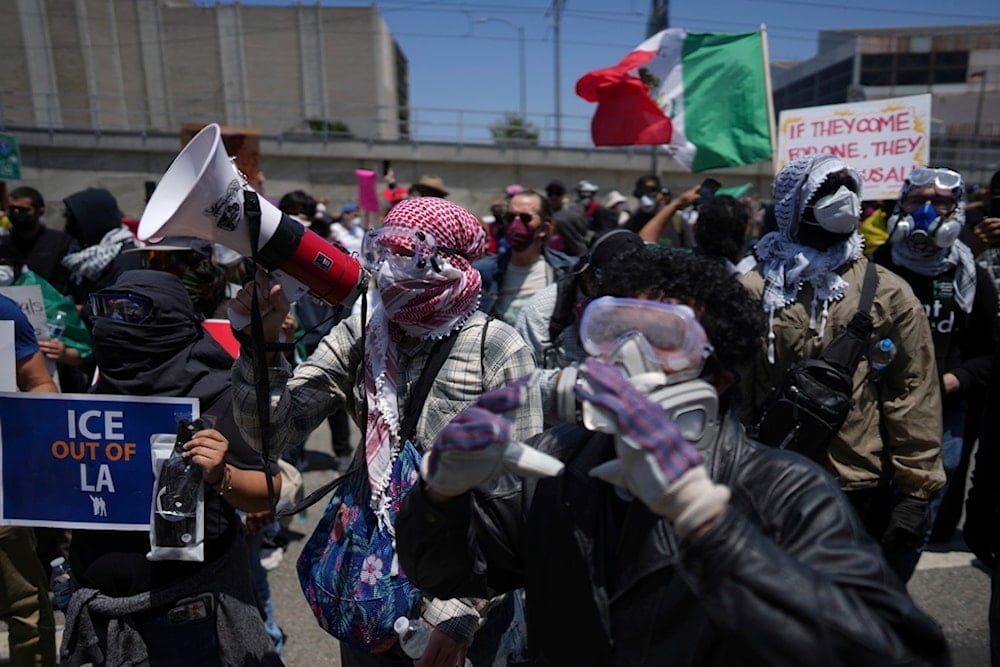Trump tests presidential authority by sending troops to quell protests
Trump's deployment of the National Guard to Los Angeles without state consent is testing the limits of his presidential authority.
-

Protesters confront a line of US National Guard in the metropolitan detention center of downtown Los Angeles, Sunday, June 8, 2025. (AP)
US President Donald Trump has ordered the National Guard into Los Angeles to confront protests over ongoing immigration raids, marking a dramatic escalation of federal power and defiance of local authority. The move, rare in modern American history, has sparked alarm among legal scholars and civil rights advocates who see it as a test of constitutional boundaries and a signal of the administration’s increasingly authoritarian direction, according to The Financial Times.
The deployment, made without the approval of California Governor Gavin Newsom or local officials, is the first of its kind since 1965, when President Lyndon Johnson sent troops to Selma, Alabama, to protect civil rights marchers. Analysts say Trump’s decision, framed as a response to "unrest" over mass deportations, uses emergency powers historically reserved for foreign threats or national insurrection, the Financial Times said.
Trump’s defense secretary, Pete Hegseth, added fuel to the fire by floating the idea of deploying the US Marines, a move that would require invoking the Insurrection Act, last used during the 1992 Los Angeles riots.
“There’s no credible justification for deploying federal troops into a liberal city already working with law enforcement,” said Ryan Enos, a professor of government at Harvard University told FT, “It’s about political optics, not policy.”
Sweeping ICE raids spark protests
The protests were triggered by sweeping Immigration and Customs Enforcement (ICE) raids that, according to critics, have cast a wide net, targeting both undocumented immigrants and legal residents. A mistaken arrest of a US marshal in Arizona, reportedly due to a vague ICE description, has highlighted the chaos surrounding the operation.
Kristi Noem, Homeland Security Secretary, defended the raids as focused on “the worst of the worst.” However, internal reporting by the conservative Washington Examiner contradicted that claim, revealing pressure from senior White House adviser Stephen Miller to widen the raids to all undocumented individuals, not just criminals.
Miller, the architect of Trump’s hardline immigration policies, warned that anything short of mass deportation would be surrendering to “insurrection.” He endorsed a viral post calling for mass removals “no matter what it costs,” asserting that “nothing else matters.”
The political pressure is mounting across the administration. Vice President J.D. Vance characterized the protests as evidence of a “foreign invasion,” while border enforcement official Tom Homan suggested Democratic lawmakers, including House Minority Leader Hakeem Jeffries, should face Justice Department scrutiny for opposing ICE tactics.
Trump going after Democrats
In parallel, Trump has escalated threats beyond immigration. He’s called for investigations into former President Biden and former officials, floated the cancellation of federal contracts with Elon Musk’s companies, and warned of “serious consequences” if Musk backs Democratic candidates.
Critics say this convergence of aggressive immigration policy, military deployment, and attacks on political rivals represents a broader strategy to consolidate executive power.
“This isn’t just about immigration,” said Andrew Weinstein, former US Public Delegate to the UN under Biden, according to the Financial Times. “It’s about using every lever of government to erode checks and balances and centralize control.”
The American Civil Liberties Union and other legal groups have already begun preparing lawsuits, arguing that Trump’s actions may violate both the Constitution and federal law governing the deployment of troops on domestic soil.
Despite widespread condemnation, public sentiment remains mixed. A recent YouGov-CBS poll found 54% of Americans supported Trump’s immigration plan. That support waned when respondents were told non-criminal immigrants were being targeted.
In sharp contrast to 2020, when then-Defense Secretary Mark Esper refused to send troops into cities during Black Lives Matter protests, the current administration has faced little internal dissent.
“We’re going to have troops everywhere,” Trump told reporters on Sunday. “We’re not going to let our country be torn apart like it was under Biden.”

 4 Min Read
4 Min Read










